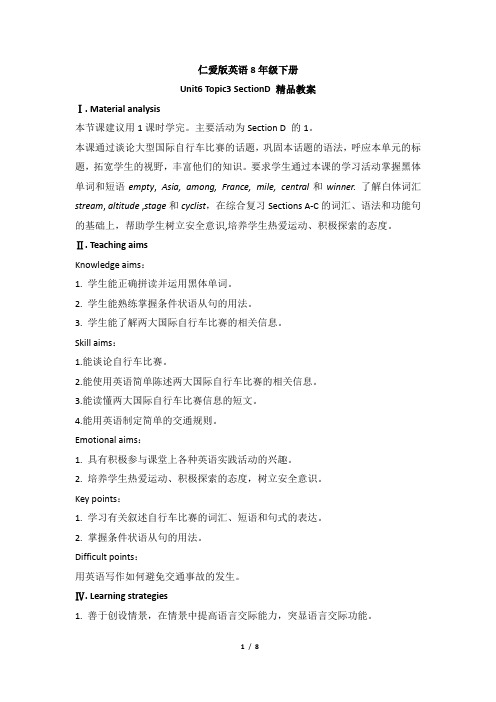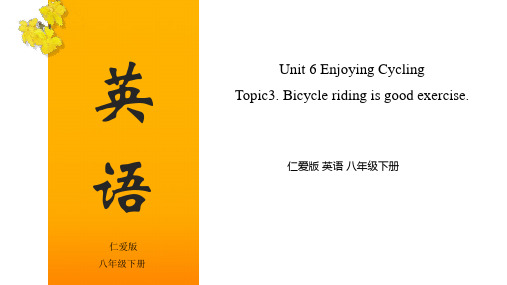仁爱英语八年级下Unit6 topic3sectionA课件
- 格式:ppt
- 大小:4.16 MB
- 文档页数:10




仁爱版英语8年级下册Unit6 Topic3 SectionD 精品教案Ⅰ. Material analysis本节课建议用1课时学完。
主要活动为Section D 的1。
本课通过谈论大型国际自行车比赛的话题,巩固本话题的语法,呼应本单元的标题,拓宽学生的视野,丰富他们的知识。
要求学生通过本课的学习活动掌握黑体单词和短语empty, Asia, among, France, mile, central和winner.了解白体词汇stream, altitude ,stage和cyclist,在综合复习Sections A-C的词汇、语法和功能句的基础上,帮助学生树立安全意识,培养学生热爱运动、积极探索的态度。
Ⅱ. Teaching aimsKnowledge aims:1. 学生能正确拼读并运用黑体单词。
2. 学生能熟练掌握条件状语从句的用法。
3. 学生能了解两大国际自行车比赛的相关信息。
Skill aims:1.能谈论自行车比赛。
2.能使用英语简单陈述两大国际自行车比赛的相关信息。
3.能读懂两大国际自行车比赛信息的短文。
4.能用英语制定简单的交通规则。
Emotional aims:1. 具有积极参与课堂上各种英语实践活动的兴趣。
2. 培养学生热爱运动、积极探索的态度,树立安全意识。
Key points:1. 学习有关叙述自行车比赛的词汇、短语和句式的表达。
2. 掌握条件状语从句的用法。
Difficult points:用英语写作如何避免交通事故的发生。
Ⅳ. Learning strategies1. 善于创设情景,在情景中提高语言交际能力,突显语言交际功能。
2. 在日常学习中不断开阔视野,扩大知识面。
Ⅴ. Teaching aidsComputer multimedia projector,the video of a bicycle race, the maps of Asia and France, the picture and the stages.Ⅵ. Teaching proceduresⅦ. Blackboard design。


Topic3 教材知识详解1. When I first arrived, I was afraid of riding my bike anywhere.当我刚来时,在哪儿都不敢骑自行车。
anywhere在表示“任何地方”时可用于肯定句。
常用于疑问句和否定句中,代替somewhere,意为“任何地方”。
如:An accident can happen anywhere.任何地方都可能发生事故。
everywhere意为“到处,处处”,相当于here and there。
如:He follows me everywhere.我无论去哪他都跟着。
I can’t find it anywhere.我在哪儿都找不到它。
Did you go anywhere interesting? 你去过什么有趣的地方吗?2.Cycling can help us save energy and it doesn’t cause air pollution.骑自行车能帮助我们节约能源,并且不会造成空气污染。
(1) save energy意为“节约能源”,save time节约时间,save money省钱;save one’s life意为“救某人的命”。
如:We should turn off lights after school to save energy.放学后,我们要关灯以节约能源。
(2) air pollution意为“空气污染”。
water pollution 水污染;noise pollution 噪音污染;light pollution光污染。
【链接】pollute v.污染;polluter n.污染源,污染者。
如:The factory caused air pollution terribly in the area.这个工厂导致该地区空气严重污染。
3. If we break the traffic rules, we may get a fine and even be in danger.如果我们违反交通规则,我们可能会被处以罚金,甚至会处于危险之中。
Unit 6 Topic3一. 重点单词(所有程度学生都要掌握)pollute (v.)——pollution(n.)advantage(n.)——disadvantage (反义词) disagree(v.)——agree(反义词)rider(n.)——ride(v.)careless(adj.)——careful (反义词)——care (v./n.)safe(adj.)——safety(n.)——safely(adv.) Asia(n.)——Asian(adj.)France(n.)——French(adj.)center(n.)——central(adj.)win(v.)——winner(n.)cycle (v.)——cyclist(n.)二·词组(△的程度较差可以不掌握,中、上学生需全部掌握)Section A1. a traffic accident 一个交通事故2. be hurt 受伤3. be afraid of doing/to do sth. 害怕做某事4. get used to sth./doing sth. 习惯于做某事5. a little more confident 稍微有点更自信6. obey/break the traffic rules 遵守/违反交通规则7. fewer accidents 更少的事故8. save energy 节约能源9. cause air pollution 导致空气污染10. park bikes 停自行车11. have an accident 发生事故12. send sb. to the hospital 把某人送去医院Section B13. light-colored clothes 浅色的衣服14. get a fine/ticket 得到一张罚单15. cross the road 过马路16. make a wrong turn 转错弯17. cause trouble 导致18. on the left-hand side of the road 在路的左手边Section C19. pay attention to (doing) sth. 注意20. traffic signals 交通信号21. obey the safety rules 遵守安全规则22. wear helmets 戴头盔23. share sth. with sb. 跟某人分享某事24. in case of 如果,假设25. give first aid 进行急救26. call sb./sth. for help 打电话寻求帮助27. In a word 总之28. make a call 打电话29. play on the street 在街上玩耍Section D30. salt-water lakes 咸水湖31. empty into… 注入…32. in Asia 在亚洲33. go through 穿过34. an accident report 交通事故报告单35. be broken 坏了三.重点句子(所有程度学生都要掌握)Section A1. If people obey the traffic rules, there will be fewer accidents.如果人们遵守交通规则,将会有更少事故。
Unit 6 Topic 3Section A 1.IthinktrafficinBeijingiscrazy.我认为北京的交通很拥挤。
crazy在句中意为“拥挤的”。
Trafficiscrazy.相当于Trafficisheavy/busy/terrible.意为“交通拥堵。
”如Insomebigcities,trafficiscrazy.在一些大城市,交通很拥堵。
而crazy本意是“不理智的,疯狂的”。
如:Areyoucrazy?你疯了吗?Shemustbecrazytolendhimmoney.把钱借给他,她一定是疯了【拓展】becrazyaboutsth.热衷于,becrazyaboutsb.迷恋,爱上。
如:Rickiscrazyaboutfootball.瑞克十分热衷于足球。
Hewascrazyabouther.他狂热地爱上了她。
2.WhenIfirstarrived,Iwasafraidofridingmybikeanywhere.当我刚到这儿时,无论在哪我都害怕骑车。
anywhere在肯定句中意为“无论何处,随便哪里”。
如:Puttheboxdownanywhere.箱子随便放在哪都行。
Anaccidentmayhappenanywhere.任何地方都可能会发生事故。
【拓展】anywhere多用于疑问句和否定句中,意为“什么地方”。
如Didyougoanywhereinteresting?你去了什么有趣的地方吗?Ican‟t see Tomanywhere.我哪儿都看不到汤姆。
3.Ifpeopleobeythetrafficrules,therewillbefeweraccidents.如果人们遵守交通规则,交通事故就会减少。
if意为“如果,要是,假如,倘若”,引导条件状语从句。
由if引导的条件状语从句,若主句是将来时态、祈使句或含有情态动词时,从句常用一般现在时。
如Ifyouareill,youmustgotoseethedoctor.你如果病了,就必须去看医生。